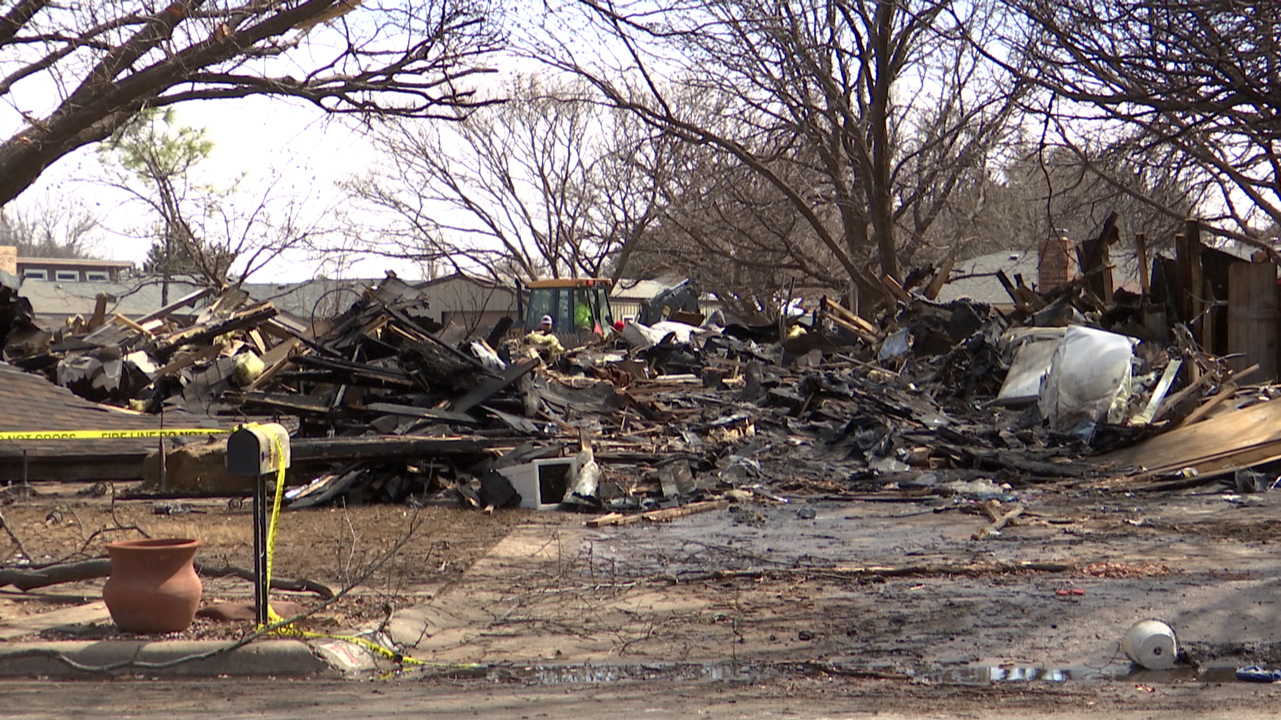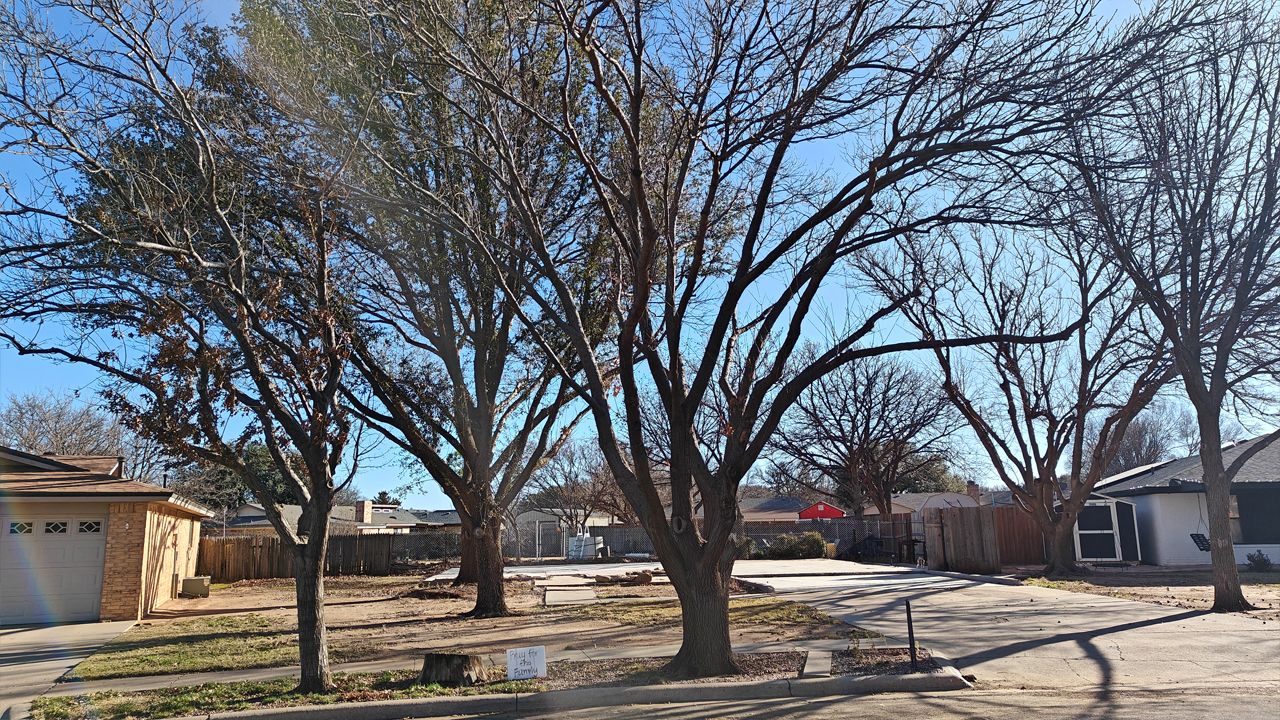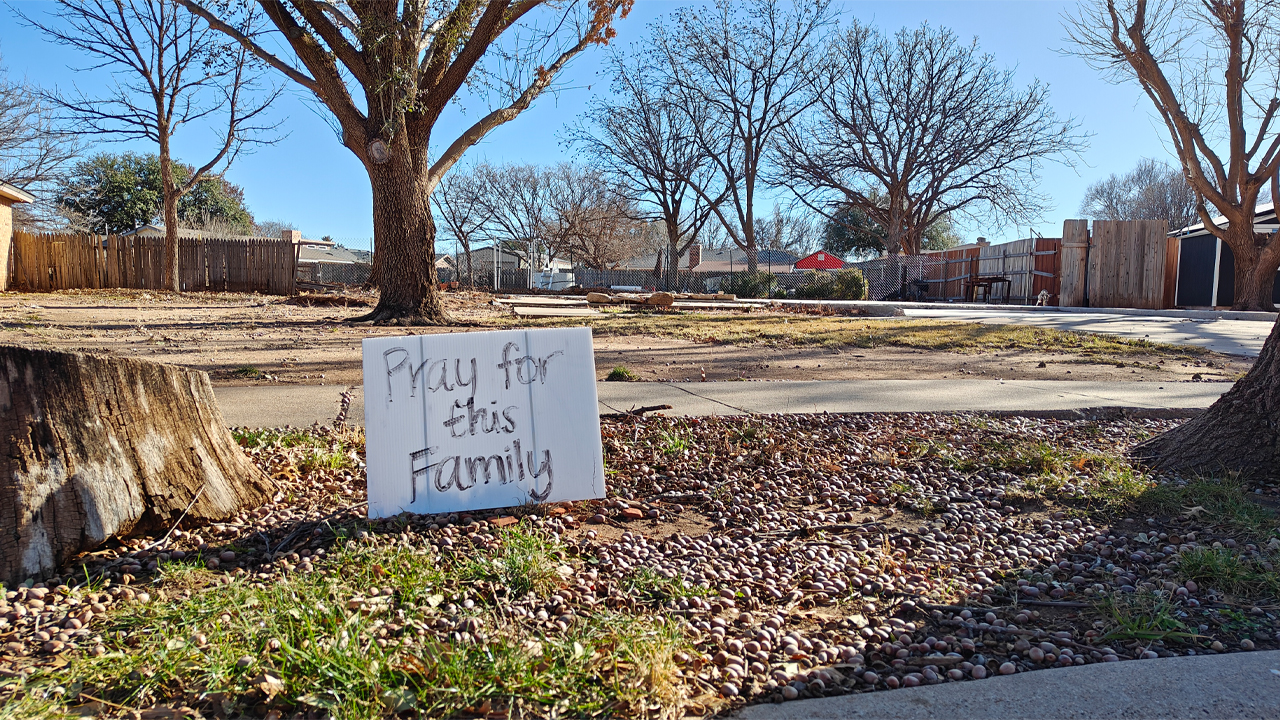Empty lot where a house used to be in the 3300 block of 89th St.
Lubbock fully admits blame for a 2022 house explosion. Despite the admission and property damage totaling more than half a million dollars, the city paid $100,000.
A city crew was working on a sewer line behind the home of Mark and Evelyn Gibbs in the 3300 block of 89th Street. A worker using a backhoe damaged a gas line. Workers stopped and called for help.
It was too late. Natural gas went from the broken gas line into the sewer pipe and into the home causing a fireball. Firefighters evacuated nearby homes and made sure no one was hurt.
The blast destroyed the home along with personal items and family memories inside.
“Our parents have lost everything they’ve built in this home: from family photo albums, wedding rings, and keepsakes that can never be replaced, to basic necessities like clothes, toothbrushes, makeup, shoes, and food,” said a GoFundMe page.
A dog survived but not the family cats. The city demolished the home right away. An insurance policy covered the family for what the city did not. The Gibbs purchased another house in Lubbock which they still own, according to tax records.
In mid-September, the City Council was briefed behind closed doors. LubbockLights.com began looking into it at that time and we now have answers.
The city gets legal protection in state law for anything above $100,000 through sovereign immunity. Raising those limits could happen, but it’s a more complicated issue than that – which we explain further down.

The timeline
LubbockLights.com recently acquired a settlement claim from the city with the results of an investigation.
A city crew arrived in the alley on May 10 about 11:30 that morning. Utility lines were marked but faintly. Crew members dug down to the sewer pipe. They had trouble figuring out what was wrong with the pipe, so they took a lunch break and got a special camera to look inside the sewer.
Once they saw inside the pipe, they were ready to keep going. But they needed to dig out a little more dirt to put in some new pipe. That’s when the trouble started.
The backhoe operator just barely nicked a two-inch gas line. Crew members called for help at 2:46 p.m. The fire department arrived four minutes later.
The gas levels in the air did not seem that bad. At first, firefighters did not evacuate anyone except the city crew.
Atmos Energy employees arrived. The plan was to dig another hole nearby and clamp the gas line. It would take time – which they didn’t have.
According to the settlement claim, two city employees told firefighters the same thing: “Gas is going into the house.”
They knew this because they were among the same employees who accidentally hit the gas line. They knew where it was in comparison to the open sewer pipe behind the house.
The explosion happened at 3:50 p.m. Actually, it was two explosions. The first one blew off the garage doors and a few windows. A second one lifted the roof and sent a fireball 50 feet into the air.
“All of a sudden, a bomb went off,” the settlement claim said. It was not a literal bomb. The gas found its way possibly to the pilot light of the home’s furnace or the water heater.
That’s when the neighborhood evacuation began.
How it went wrong
Utility lines must be marked, according to city policy. That was done a week beforehand, according to a report from the Texas Railroad Commission, which regulates oil and gas in the state.
But city policy also says, “Hand excavation shall be used where necessary.”
That didn’t happen.
“The crew did not follow their excavation protocol and expose the
gas main by hand before continuing the mechanical excavation,” the settlement claim said.
The city made corrections and we’ll get to that.
The Gibbs family suffered more than $500,000 damage to the home and personal possessions. The next-door neighbor suffered more than $6,000.
Atmos Energy lost more than $36,000 between property damage and labor costs.
That’s the law
The Gibbs family did not want to talk to LubbockLights.com, but an attorney for their insurance company, Ronald W. Harmeyer, did.
“You could easily have a million-dollar loss – people dying left and right,” Harmeyer said. But the city’s obligation ends at $100,000 for an incident even if there are multiple victims and multiple lost properties.
“If the taxpayers of Lubbock benefit from a functioning government, and they are, then there’s no reason the city cannot buy insurance like everyone else,” Harmeyer said.
That’s the law,” he added. “I don’t make it.”
The king can do no wrong
The city is protected under sovereign immunity. In simplistic terms, there was a time when the king was sovereign, and you could not sue him. Today, you cannot sue the government unless you have the government’s permission.
Marcus Norris, the former city attorney for Amarillo, explained this process.
“Sovereign immunity has ancient roots. It goes all the way back to the days of kings and knights and ladies and lords,” Norris said.
“If the king in his coach was racing down the road and your child is playing by the road and the king ran over the child, the king’s not liable,” Norris said. “If he wants to drive his coach recklessly down the road, then that’s the law.”
Harmeyer said it’s time to change Texas law, which is similar in most states.
“A thousand years ago, if the sovereign were appointed by God and could do no wrong, then yes,” Harmeyer said. “But I don’t see the intellectual basis for that cap.”
Norris disagrees.
The case for keeping it
If we as residents sue our own local government, we are punishing ourselves. We pay more in taxes, or we get less city services, Norris said.
Suppose a city employee or a city contractor had a really bad day, Norris imagined. Suppose it led to a gas leak and a house explosion. Lubbock could probably pay to replace a $300,000 home. Idalou or Ransom Canyon, he said, might not take the cost in stride.
“Even $100,000 is a tremendous amount of money for the small community,” Norris said. “It could even cause the city government to have to file for bankruptcy.”
“We really don’t particularly want to see a city having to close its libraries and sell the property – lay off employees – lay off firemen and policeman,” Norris said.
“Government does things that are dangerous,” Norris said. Police officers might confront a bank robber. A firefighter might go into a burning house.
Norris agrees the Texas Legislature can take another look at the dollar amounts. Inflation and the cost of living have gone up over the years. So, the city’s limit could also go up, he said.
Make changes, or keep it the same
LubbockLights.com asked if the limits should be higher for bigger cities and lower for small towns.
“It now depends on where you live, whether you’re made whole or not,” Norris said. “It’s the same $300,000 house in Idalou.”
It’s not fair, Norris believes, if a Lubbock homeowner gets paid back, for example, $300,000, but the one in Idalou gets far less.
“You’re sure lucky to have gotten damaged by a neighboring city employee in a big city rather than in Idalou or Ransom Canyon,” he said.
It’s not good public policy, he said.
When asked about voluntarily lifting the limit – a city choosing for itself when to take more responsibility – Norris said it trades one problem for another.
“Well, which side of town are they from? You’ve waived it more often for that neighborhood than you have for claims in other neighborhoods,” he said.
“It needs to be treating everyone in the community the same regardless of race, creed, color, religion, on and on,” he said.

Social compact and civil rights
Over the years, states have traded away some of their protection under sovereign immunity in favor of something called a social compact. The idea goes something like this.
“On the one hand, we want government to be responsible,” Norris said. “There should be accountability. On the other hand, we, as citizens, do not want our city government bankrupted.”
The limit for negligence claims under the Texas Tort Claims Act does not apply to civil rights violations.
Federal law allows someone to sue both a government agency and government employee for civil rights. It’s not quite that simple. There are technicalities, but a civil rights violation is not the same as negligence.
Lessons learned
The city did make corrections.
“All pipeline maintenance crews now have a tool to temporarily plug lines running from the main lines to private property,” the city said in a statement by city spokesperson Lauren Adams.
“Lubbock holds regular meetings with Atmos to coordinate and ensure best practices are followed,” the statement said.
The city already had yearly training for employees. But now, there’s more.
“The city is fortunate to have the president of the South Plains Chapter of the Damage Prevention Council, Josh Flud, on staff,” Adams said.
This year, Flud organized a workshop for both contractors and city crews. The plan is to offer more workshops.


 Facebook
Facebook